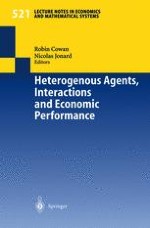2003 | OriginalPaper | Chapter
Adaptive Coordination and Aggregate Efficiency in Minority Games
Authors : G. Bottazzi, G. Devetag, G. Dosi
Published in: Heterogenous Agents, Interactions and Economic Performance
Publisher: Springer Berlin Heidelberg
Included in: Professional Book Archive
Activate our intelligent search to find suitable subject content or patents.
Select sections of text to find matching patents with Artificial Intelligence. powered by
Select sections of text to find additional relevant content using AI-assisted search. powered by
This work studies the properties of a coordination game in which agents repeatedly compete to be in the population minority. The game reflects some essential features of those economic situations in which positive rewards are assigned to individuals who behave in opposition to the modal behavior in a population. Here we model a group of heterogeneous agents who adaptively learn and we investigate the transient and long-run aggregate properties of the system in terms of both allocative and informational efficiency. Our results show that, first, the system long-run properties strongly depend on the behavioral learning rules adopted, and, second, adding noise at the individual decision level and hence increasing heterogeneity in the population substantially improve aggregate welfare, although at the expense of a longer adjustment phase. In fact, the system achieves in that way a higher level than that attainable by perfectly rational and completely informed agents.
